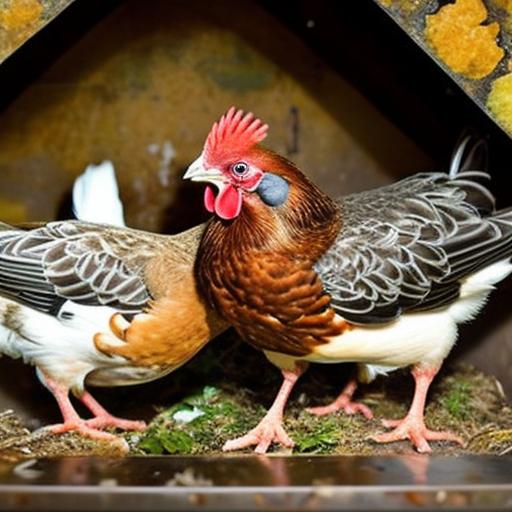Keeping chickens in a basement may seem like an unconventional idea, but it is becoming a growing trend among urban dwellers. With the desire for fresh eggs and a sustainable food source, more and more people are turning to backyard chicken keeping. However, for those who live in apartments or have limited outdoor space, keeping chickens in a basement can be a viable option. In this article, we will explore the pros and cons of basement chicken keeping, the requirements of basement chicken coops, choosing the right breeds, setting up a safe and comfortable environment, proper ventilation and lighting, feeding and watering, health and hygiene considerations, dealing with noise and odor issues, legal and zoning regulations, and tips for successful basement chicken keeping.
Key Takeaways
- Keeping chickens in a basement can provide fresh eggs and meat, but it also has drawbacks such as noise and odor issues.
- Basement chicken coops require proper ventilation, lighting, and a safe environment for the chickens to thrive.
- Choosing the right breeds for basement chicken keeping is important, as some breeds are better suited for indoor living.
- Feeding and watering your basement chickens requires careful attention to their dietary needs and hygiene.
- Health and hygiene considerations are crucial for basement chicken keeping, including regular cleaning and disease prevention measures.
Pros and Cons of Keeping Chickens in a Basement
There are several advantages to keeping chickens in a basement. One of the main benefits is year-round egg production. Unlike outdoor chickens that may stop laying during the winter months, basement chickens can continue to lay eggs consistently throughout the year. This provides a reliable source of fresh eggs for the household. Additionally, basement chicken coops offer protection from predators such as raccoons or neighborhood dogs. This can give peace of mind to chicken owners who may live in areas with high predator activity.
However, there are also potential drawbacks to consider when keeping chickens in a basement. One of the main concerns is noise. Chickens can be quite vocal, especially when they are laying eggs or feeling stressed. This can be disruptive to neighbors or household members who are sensitive to noise. Another concern is odor. Chicken manure has a distinct smell that can become overwhelming if not properly managed. It is important to have a system in place for regular cleaning and odor control.
Understanding the Requirements of Basement Chicken Coops
Chickens have basic needs that must be met in order for them to thrive. These include space, food, water, and nesting boxes. When it comes to basement chicken coops, there are a few additional requirements to consider. Ventilation is crucial to ensure fresh air circulation and prevent respiratory issues. Proper lighting is also important to mimic natural daylight and promote egg production.
Choosing the Right Breeds for Basement Chicken Keeping
Not all chicken breeds are suitable for indoor living. Some breeds are better suited for smaller spaces and have quieter dispositions. Bantams and silkies are popular choices for basement chicken keeping due to their small size and calm nature. It is important to select breeds that will be comfortable in a confined space and not disturb the household with excessive noise.
Setting Up a Safe and Comfortable Environment for Basement Chickens
Creating a comfortable living space for basement chickens is essential for their well-being. This includes providing appropriate bedding material, such as straw or wood shavings, for them to nest and roost on. It is important to regularly clean the coop to prevent the buildup of waste and pests. Providing adequate space for the chickens to move around is also crucial for their physical and mental health.
Proper Ventilation and Lighting for Basement Chicken Coops

Proper ventilation is essential in a basement chicken coop to prevent respiratory issues. This can be achieved by installing vents or fans to ensure fresh air circulation. Lighting is also important to mimic natural daylight and promote egg production. Using full-spectrum bulbs or natural light sources can help maintain a consistent lighting schedule for the chickens.
Feeding and Watering Your Basement Chickens
Chickens require a balanced diet to stay healthy and lay eggs consistently. A combination of commercial chicken feed, grains, fruits, vegetables, and kitchen scraps can provide the necessary nutrients. It is important to provide clean water at all times and regularly check for spills or leaks that could lead to wet bedding or mold growth.
Health and Hygiene Considerations for Basement Chicken Keeping
Monitoring the health of basement chickens is crucial to catch any signs of illness early on. Regularly checking for parasites, such as mites or lice, and providing appropriate treatment is important for their well-being. Maintaining good hygiene in the coop is also essential to prevent the spread of disease. This includes regularly cleaning the coop, removing waste, and disinfecting surfaces.
Dealing with Noise and Odor Issues in Basement Chicken Coops
To reduce noise levels in a basement chicken coop, sound-absorbing materials can be used on the walls or ceiling. This can help dampen the sound of clucking or crowing. Controlling odors can be achieved by using odor-neutralizing products or incorporating proper ventilation systems. Regular cleaning and waste management are also important to prevent odor buildup.
Legal and Zoning Regulations for Basement Chicken Keeping
Before starting a basement chicken coop, it is important to research and understand the local regulations and zoning restrictions. Some areas may have specific rules regarding the number of chickens allowed, coop size, or noise limitations. Complying with these regulations is essential to avoid fines or legal issues.
Tips for Successful Basement Chicken Keeping
In summary, keeping chickens in a basement can be a rewarding experience for those who are unable to have outdoor coops. It provides a sustainable food source and the satisfaction of knowing where your eggs come from. To ensure success, it is important to choose the right breeds, set up a safe and comfortable environment, provide proper ventilation and lighting, feed and water your chickens appropriately, maintain good health and hygiene practices, address noise and odor issues, comply with legal and zoning regulations, and implement enrichment activities for your chickens.
Keeping chickens in a basement may not be the most conventional way of raising poultry, but it can be a viable option for urban dwellers or those with limited outdoor space. With the right setup and proper care, basement chicken keeping can provide fresh eggs and a sustainable food source. By understanding the requirements of basement chicken coops, choosing the right breeds, setting up a safe and comfortable environment, providing proper ventilation and lighting, feeding and watering appropriately, maintaining good health and hygiene practices, addressing noise and odor issues, complying with legal and zoning regulations, and implementing enrichment activities, you can successfully keep chickens in your basement. So why not consider starting your own basement chicken coop and enjoy the benefits of having fresh eggs right at your doorstep?
If you’re wondering about the feasibility of keeping chickens in a basement, you may also be interested in learning about the ideal size for a chicken coop door. Poultry Wizard has an informative article that discusses the importance of choosing the right door size for your chicken coop. Understanding the proper dimensions can ensure easy access for both you and your feathered friends. To read more about this topic, check out their article on chicken coop door size. Additionally, if you’re looking for alternative housing options for your chickens, Poultry Wizard offers insights into building an A-frame chicken coop and even explores the benefits of a chicken coop in Grand Island, NE.
FAQs
Can you keep chickens in a basement?
Yes, it is possible to keep chickens in a basement. However, there are certain factors that need to be considered before doing so.
What are the factors to consider before keeping chickens in a basement?
Some of the factors to consider include proper ventilation, adequate space, access to natural light, and proper waste management.
What kind of ventilation is needed for keeping chickens in a basement?
Proper ventilation is crucial for keeping chickens in a basement. A ventilation system that provides fresh air and removes stale air is necessary to prevent the buildup of harmful gases such as ammonia.
How much space do chickens need in a basement?
Chickens need at least 2-3 square feet of space per bird. Therefore, the size of the basement will determine the number of chickens that can be kept.
Do chickens need access to natural light?
Yes, chickens need access to natural light for their health and well-being. If there are no windows in the basement, artificial lighting can be used to simulate natural light.
How do you manage chicken waste in a basement?
Proper waste management is important when keeping chickens in a basement. A litter material such as straw or wood shavings can be used to absorb moisture and control odor. The litter should be changed regularly, and the waste should be disposed of properly.
Meet Walter, the feathered-friend fanatic of Florida! Nestled in the sunshine state, Walter struts through life with his feathered companions, clucking his way to happiness. With a coop that’s fancier than a five-star hotel, he’s the Don Juan of the chicken world. When he’s not teaching his hens to do the cha-cha, you’ll find him in a heated debate with his prized rooster, Sir Clucks-a-Lot. Walter’s poultry passion is no yolk; he’s the sunny-side-up guy you never knew you needed in your flock of friends!







